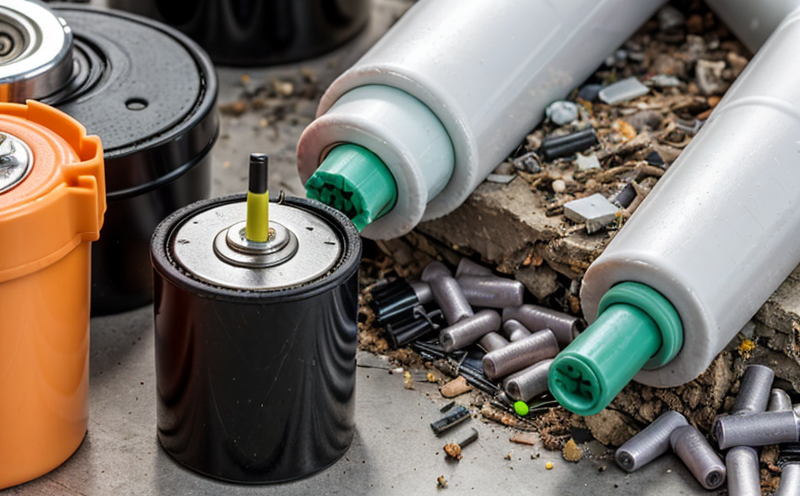UL 2054 End-of-Life Testing of Household and Commercial Batteries
The UL 2054 standard sets stringent requirements for household and commercial batteries to ensure they meet safety, performance, and environmental criteria. This service focuses on the end-of-life testing phase, which is critical for understanding the battery's behavior when it reaches its operational limits or becomes waste.
End-of-life testing evaluates various aspects of a battery’s characteristics that may affect its safe disposal or recycling process. These include:
- Electrochemical stability
- Potential for hazardous material release
- Residual energy content and heat generation during storage
- Durability under environmental stressors such as temperature, humidity, and mechanical shock
- Toxicity and leachate from battery materials
- Eco-friendly recycling methods compatibility
The testing process involves subjecting batteries to a series of simulated real-world conditions that they might encounter during their final stages. This includes:
- Charging/discharging cycles up to the specified end-of-life point
- Storage in different environmental conditions (high and low temperatures)
- Destructive testing to assess structural integrity and material behavior under stress
- Exposure to fire or other severe thermal events
- Battery disassembly and material analysis for recycling purposes
The results of this rigorous testing provide crucial insights into the battery’s performance and safety during its final stages. This information is vital for manufacturers, recyclers, and regulatory bodies to ensure that batteries are disposed of safely and recycled efficiently.
Our UL 2054 End-of-Life Testing service offers a comprehensive approach by combining advanced instrumentation with experienced personnel who understand the nuances of battery chemistry and recycling processes. We use state-of-the-art equipment such as high-precision calorimeters, thermal imaging cameras, and automated disassembly stations to gather accurate data.
The testing process ensures compliance with international standards like UL 2054 and ISO/IEC 17025 for laboratory competence. Our reports are detailed and include all relevant test parameters, specimen preparation methods, instrumentation used, and the criteria against which results were compared.
By investing in our UL 2054 End-of-Life Testing service, you can ensure that your batteries meet the highest safety standards and are prepared for responsible disposal or recycling. This not only enhances your company’s reputation but also contributes to environmental sustainability by reducing potential hazards associated with improper waste handling.
Why It Matters
The UL 2054 standard is a cornerstone of battery safety and performance, ensuring that batteries used in homes and businesses are reliable and secure. End-of-life testing plays a crucial role by addressing the challenges associated with waste management and recycling.
Here’s why this service is vital:
- Safety for Consumers: Ensures batteries do not pose risks during disposal or recycling processes.
- Environmental Protection: Helps in minimizing the environmental impact of battery waste through proper recycling methods.
- Regulatory Compliance: Meets stringent regulations set by various countries and regions.
- Sustainable Recycling Processes: Provides data necessary for developing eco-friendly recycling techniques.
- Innovation in Battery Design: Insights gained from testing can lead to improved battery designs that are more durable, safer, and easier to recycle.
By participating in this service, companies can demonstrate their commitment to sustainability and safety, thereby gaining a competitive edge in the market. This service is particularly beneficial for firms involved in:
- Battery manufacturing
- Recycling operations
- Retail outlets handling batteries
- Logistics companies dealing with battery shipments
The service also provides valuable data that can be used to enhance product designs, improve recycling methodologies, and guide policy-making efforts towards more sustainable practices.
Environmental and Sustainability Contributions
- Reduction in Hazardous Waste: By ensuring batteries are handled safely during disposal or recycling, the service helps prevent hazardous materials from entering landfills.
- Promotion of Recycling: Data obtained from testing aids in developing more efficient and environmentally friendly recycling processes.
- Support for Circular Economy: Encourages a circular economy approach by focusing on sustainable waste management practices.
- Energy Efficiency Improvements: Insights gained contribute to the development of longer-lasting, more energy-efficient batteries.
- Better Recycling Rates: Ensures that batteries are recycled rather than disposed of improperly, thus maximizing resource recovery.
- Lower Carbon Footprint: By promoting recycling and proper disposal methods, the service helps reduce the carbon footprint associated with battery production and waste management.
The service also supports global initiatives aimed at reducing electronic waste (e-waste) by providing scientific evidence that can be used to advocate for stricter regulations on battery use and disposal.
Competitive Advantage and Market Impact
In today’s competitive market, companies are increasingly focusing on sustainability and safety as key factors in product development. Our UL 2054 End-of-Life Testing service offers several advantages that can significantly impact your business:
- Demonstrated Commitment to Safety and Sustainability: By offering this service, you signal your commitment to responsible waste management practices.
- Enhanced Reputation and Trust: Demonstrating compliance with international standards enhances your company’s reputation and builds trust among consumers and stakeholders.
- Potential for New Markets: Meeting stringent safety and environmental criteria opens up new markets that prioritize these factors in their procurement decisions.
- Innovation Opportunities: Insights gained from testing can lead to innovations in battery design, recycling methods, and waste management strategies.
- Regulatory Compliance: Ensures compliance with regulations set by various countries and regions, avoiding potential fines or penalties.
- Potential for Cost Savings: By ensuring batteries are safely disposed of or recycled, you avoid costly environmental cleanup efforts and potential legal actions.
The service also provides a competitive edge by enabling companies to stay ahead of regulatory changes and industry trends. This foresight can lead to strategic advantages in the market, helping firms maintain their position as leaders in sustainability and safety.





